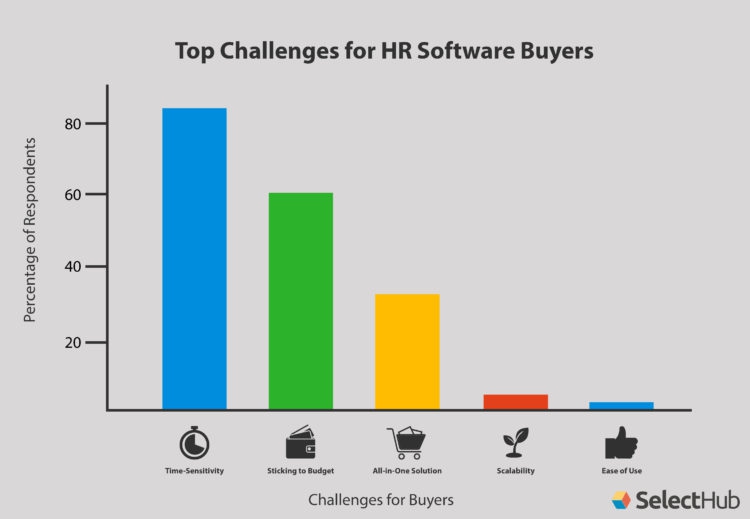There are many loopholes in the available services that prevent HR software buyers from making satisfactory buying decisions.
With technology and automation reducing the once tedious manual HR tasks to a matter of a few clicks, software solutions have become a preferred work buddy for HR in organisations. So much so, that HR software is one of the leaders in the business software market. Despite the progress, there are a few loopholes in the available services that hold back HR software buyers from making quick and satisfactory buying decisions.
A survey by a technology selection management platform, SelectHub, revealed the biggest hurdles HR software buyers come across while making decisions. Here are the five identified challenges that hamper purchase choices.
Time-sensitivity
The survey results show that a major concern of 85 per cent of the respondents is lack of time to make a decision. The challenge appears stronger when organisations look to choose and/or deploy a new HR vendor within six months. Since HR is an important function that deals with every employee in the organisation, it cannot afford to have long renovation breaks for its systems.
Inefficient HR processes can impact various aspects in an organisation, from slowing down onboarding to spreading dissatisfaction among employees, thus leading to lower productivity. Therefore, it is crucial for HR to fix inefficiencies quickly, leaving buyers very little time to clean up the mess their current vendor has left them in.
Budget constraints
The second most commonly cited concern was budget. 60 per cent of the respondents of the survey stated budget constraints as a hurdle in their buying decisions. This is primarily because organisations do not want to spend a large part of their revenue on software, irrespective of its level of importance. As HR is considered a cost centre in most organisations, software buying budgets are always handled with a leash on them.
However, on a positive note, 40 per cent of the respondents were still open to hearing the full range of prices for new vendors.
No perfect single solution
A one-stop-shop is what most buyers expect from HR software solutions, and finding that is far from easy. A lot of buyers—33 per cent as per the survey—admit that finding an all-in-one solution for all their HR needs is one of their biggest challenges. Buyers state lack of vendors, who can cater to all their requirements, as one of the most prominent issues. There are a number of vendors specialising in specific features, such as an applicant tracking system or payroll processing, and so on, but there are not too many that provide a holistic solution.
Scalability
Among other concerns, scalability of the available HR software solutions is a significant one. Although this may not be a highly cited one, with only six per cent of the respondents saying it is a cause of worry for them, this is one aspect in the absence of which a software solution, no matter how efficient, can prove to be useless for a large setup.
Ease of Use
The fifth roadblock in HR software buying decisions is the ease of use a solution offers. Despite the fact that only three per cent of the survey respondents see it as a challenge, user-friendliness of HR software solutions is one big concern for most HR professionals across industries. Most HR leaders are of the view that technology that is inconvenient to use is no good for business. Complicated platforms only add to the time and effort consumed in the HR processes, rather than simplifying them, which is the core purpose behind buying these solutions.




1 Comment
Am a little sceptical with the findings from this survey. First there is no time constraint, especially if you are to migrate from the existing platform onto a new one you better mitigate all the existing problems and don’t ever carry them onto the new platform – so it’s worth the time spent. Second I would recommend you have a strong foundation module and every other ‘fantasised’ functionality can be invested upon and conveniently interfaced to the foundation application platform. Third scale with Cloud solutions will not be a concern – yeah it might come with a premium and it’s worth it. Fourth for ease of use – do not over burden the system with customisation, save it, and it will help you in change management and efficiency of delivery. These are purely my views with the experience from the past and current implementation am going through.